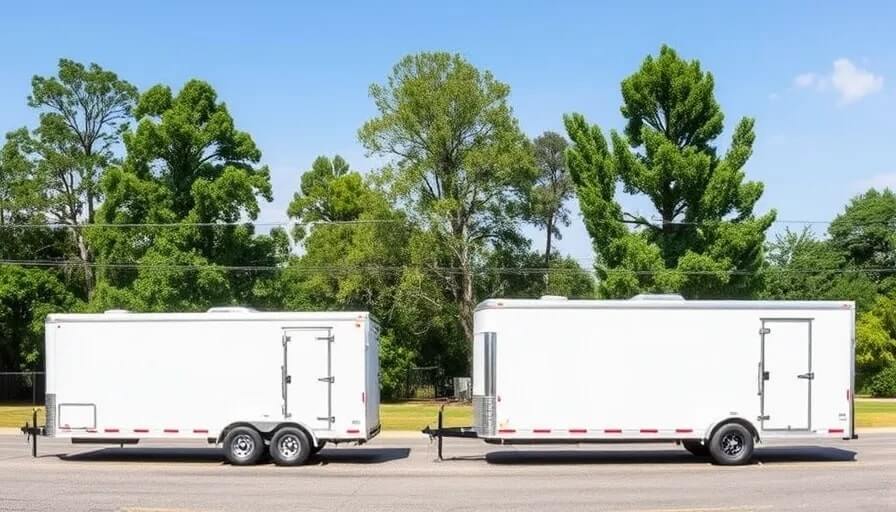

Understanding the right trailer size is crucial for ensuring your transportation needs are met efficiently and safely. Whether you’re hauling personal belongings, vehicles, or commercial goods, knowing trailer sizes and trailer dimensions can significantly impact your towing experience.
This guide will help you navigate the various aspects of trailer sizing, ensuring you make an informed decision that aligns with your specific requirements.
It’s essential to grasp the common measurements that define standard trailer sizes. Standard trailers are designed to meet specific industry norms, ensuring compatibility with various vehicles and roadways.
Typically, these trailers adhere to predefined dimensions to guarantee safety and ease of use. Understanding standard trailer dimensions involves looking at trailer width, length, and weight capacity.
A typical standard trailer width is around 6 feet, which aligns with legal road transport limits without requiring special permits. The standard trailer length often falls between 16 and 20 feet, balancing cargo capacity and maneuverability.
These measurements are carefully selected to accommodate various types of cargo while ensuring that the trailer remains manageable for most towing vehicles.
Additionally, standard trailer sizes simplify finding compatible accessories and replacement parts. Whether you need tie-downs, lighting systems, or hitch components, standardized dimensions ensure that most products on the market will fit your trailer seamlessly.
Adhering to standard trailer dimensions can avoid common issues related to mismatched parts and ensure a smoother towing experience. Understanding these standards helps select the right trailer and ensures compliance with transportation regulations, making your towing operations both efficient and lawful.
One of the most common questions is, “How wide is a trailer?” The width of your trailer is a crucial factor impacting the ease of towing and the cargo you can transport. Trailer width varies significantly depending on the trailer type and its intended use.
Most standard trailers have a width of about 6 feet, generally the maximum allowable width for road transport without requiring special permits. However, there are variations.
Typically, car trailers range from 6 to 7 feet in width to accommodate different vehicle sizes. On the other hand, specialized trailers often have widths up to 8 feet to ensure they can securely transport larger or multiple vehicles.
Answering the question of how wide trailers are can help you determine the best trailer for your needs. If you frequently transport wide or bulky items, opting for a trailer with a greater width might be necessary.
Additionally, considering the car trailer width and car hauler width ensures your vehicles are transported safely without risking damage or instability during transit.

Another pivotal aspect to consider is how long is a trailer? The trailer length affects the cargo you can carry and the maneuverability and compatibility with your towing vehicle. Trailer length can vary widely based on the type and intended purpose.
The average trailer length usually ranges from 12 to 16 feet for utility trailers, while larger trailers can extend up to 24 feet or more. Standard trailer length typically refers to lengths that are most commonly used and efficiently accommodated by most towing vehicles and roads.
For example, a 16-foot trailer is popular for personal and commercial use due to its balanced size, which offers ample space without being overly cumbersome.
When deciding the trailer size you need, consider factors such as the type and volume of cargo, the towing capacity of your vehicle, and the typical routes you’ll be navigating.
A longer trailer may offer more space, but it can also be more challenging to maneuver, especially in tight spaces or urban areas
Trailer Size Charts: A Comprehensive Reference
Navigating the myriad of trailer sizes can be daunting, but a trailer size chart is an invaluable tool to simplify this process. A trailer sizes chart visually represents various trailer dimensions, helping you compare different models and select the best fit for your requirements.
Using a trailer size chart, you can quickly identify the dimensions of different trailer types, including their length and width. This comparison is crucial for understanding how each trailer will fit your specific needs, whether you’re transporting vehicles, equipment, or other goods.
Additionally, a trailer size chart can highlight the trailer dimensions that comply with road regulations, ensuring that your trailer meets all legal requirements for safe transportation.
| Trailer Type | Length (ft) | Width (ft) |
| Utility Trailer | 8 – 20 | 4 – 8 |
| Enclosed Cargo Trailer | 10 – 24 | 6 – 8.5 |
| Gooseneck Trailer | 20 – 40 | 8 – 8.5 |
| Car Hauler Trailer | 16 – 24 | 8 – 8.5 |
| Dump Trailer | 10 – 18 | 6 – 8.5 |
Moreover, comparing trailer sizes across different brands and models allows you to decide based on size and functionality. Whether you want to buy utility trailers, enclosed trailers, or car haulers, the trailer sizes chart offers a detailed reference that simplifies your selection procedure.

Choosing the appropriate trailer size is a decision that hinges on a thorough assessment of your transportation requirements. When you ask, “What size trailer do I need?” It’s vital to evaluate the average trailer size that fits your cargo and usage patterns.
Whether you need a car trailer size for personal vehicles or a larger trailer for commercial purposes, understanding the typical trailer dimensions is vital.
Start by evaluating the type and volume of cargo you plan to transport. For instance, if you’re frequently hauling large vehicles, a trailer with greater length and width is essential to ensure safe and secure transportation.
Consider the average trailer size relative to your towing vehicle’s capacity. Ensuring your vehicle can handle the trailer length and width without compromising safety is crucial.
Other factors to consider include the trailer dimensions related to storage and maneuverability. If you have limited storage space or often navigate tight areas, opting for a more compact trailer might be beneficial.
By carefully assessing your needs and understanding the average trailer size and dimensions, you can select a trailer that perfectly balances capacity and convenience.
Furthermore, understanding the size of the car trailer is vital for transporting vehicles. A trailer that’s too small may lead to improper loading, while one that’s too large could be unnecessarily cumbersome.
Evaluating the typical trailer dimensions ensures that you choose a trailer that fits your cargo and integrates seamlessly with your towing setup, providing both efficiency and safety during transit.
Several key factors influence selecting the right trailer size for your needs. Understanding these factors ensures that you pick a trailer that meets your current requirements and provides flexibility for future needs.
Purpose and usage play a significant role in determining the appropriate trailer size. Whether the trailer is used for personal projects, commercial transportation, or recreational activities, each purpose demands different trailer sizes and dimensions.
For example, a utility trailer for home improvement projects may require different dimensions than a car hauler trailer for transporting vehicles.
Towing vehicle compatibility is another critical factor. Ensuring your vehicle can handle the selected standard trailer dimensions, including both trailer length and width, is essential for safe towing. Overloading your vehicle with an oversized trailer can lead to handling issues and increased wear and tear.
Regulatory requirements must also be considered when selecting a trailer size. States and countries have varying laws regarding maximum trailer sizes, including length and width restrictions. Adhering to these regulations ensures compliance and promotes safety on the roads.
Lastly, storage and maneuverability are essential considerations. If you have limited storage space or frequently navigate through tight areas, selecting a trailer with trailer dimensions that accommodate these constraints will make your towing experience more manageable.
Considering these factors, you can choose a trailer size that perfectly fits your needs and circumstances.

At Millennium Trailers, we understand that deciding on the right trailer is essential for your transportation needs. Explore our extensive selection of trailers tailored to your requirements to secure your reliable trailers.
We have the perfect solution, whether you need a compact car trailer size or a spacious car hauler trailer with a generous trailer width. Our commitment to quality ensures that every trailer we offer meets the highest durability and performance standards.
With various trailer sizes, you can easily find the ideal match for your towing vehicle and cargo needs. Our knowledgeable team is here to assist you in understanding the different trailer dimensions and help you determine the perfect trailer size based on your unique situation.
Financing your trailer is simple with our user-friendly financing app. It makes investing in a high-quality trailer without financial strain easier than ever. We prioritize customer satisfaction by providing personalized support throughout your purchasing journey, ensuring you find a trailer that fits your needs and budget.
Let us be your trusted partner in all your towing endeavors, providing you with the tools and support you need for a seamless transportation experience.
Browse our Comprehensive Range of Trailers
Millennium Trailers is your trusted partner for high-quality trailers at unbeatable prices. Serving all 50 states, we’ve delivered over 5,000 trailers nationwide.
Established in 1998, we’re a company dedicated to meeting your hauling needs with excellence. Whether it’s cargo trailers or custom living quarters, we provide a wide range of options to suit your requirements. Our knowledgeable and friendly team ensures a smooth buying experience with personalized assistance. Proudly offering competitive pricing, state-of-the-art designs, and easy financing options. Committed to customer satisfaction, we strive to simplify the process of finding your perfect trailer.
Choose Millennium Trailers for a reliable, customized solution that delivers quality and value for your investment.
Copyright 1998 – 2023 Millennium Trailers, Inc.